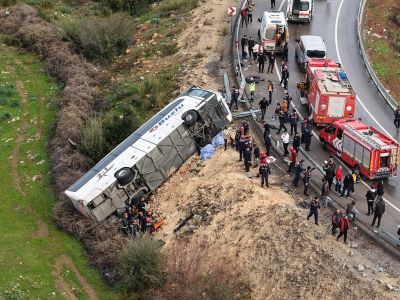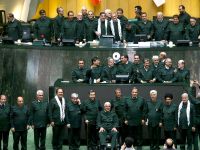By Nida Ramahi
Amman
Former head of the Palestinian negotiating team with Israel, Haidar Abdul-shafi has voiced pessimism about the prospects of peace with Israel, and said that he didn’t expect any breakthrough in the near future.
He told Albawaba.com that the Palestinian side has already made too many concessions and if Israel and the world are not ready to accept the most minimal demand, then the Palestinians must stop negotiating and instead work on creating internal democratic change, needed to strengthen the Palestinian voice.
Regarding the issue of Jerusalem and whether certain concessions on other non-negotiable points will have to be made, Abdul-Shafi said that no other concessions should be made and that no Arab leader has the right to take such decisions.
The following are excerpts of the interview:
Q: Jerusalem is being given a lot of stress. Does this mean that some of the other issues will be put on the shelf?
A: The plain acknowledged position of the Palestinian people, is that we call for an independent Palestinian state within the borders of 1967 but of course we also want to see a legitimate solution for the refugee issue, and we can’t relinquish our right to east Jerusalem. This is the Palestinian position and it means that we have sacrificed a great deal for the sake of peace, and we cannot accept anything less than this declared position.
If it appears in the Camp David negotiations that the concentration has been on Jerusalem, it doesn’t mean that we have conceded to the Jewish settlements in the occupied territory, or we have conceded on other aspects of an independent Palestinian state, control of borders, control of our air-space and sea fronts and all this.
Q: But Barak is hopeful that there will be a breakthrough when the UN General Assembly meets in the beginning of September when Clinton meets with Barak and Arafat, do you see that as being a possibility?
A: All indications and what we hear from the Israeli side do not promise a breakthrough. The Israeli side is not coming forth with regard to the settlement issue, the Jerusalem issue, the question of the refugees, or resolution 194, so it’s difficult for me to see any breakthrough; and here everyday the population holds demonstrations and issues declarations to make our political leadership aware of the mood of the people. Maybe the Israelis can bring something that deals with the issue of Jerusalem that does not mean that we are going to yield on the question of settlements the question of 194 and other aspect
Q: So you don’t see that there will be one issue compromised for another?
A: Absolutely not
Q: Do you see any form of conclusion being reached in the near future, what do you see as being possible solutions for the existing situation?
A: I don’t really see any solution because Israel is depending on its military superiority. The Americans have promised to keep it superior to the combined Arab force, how will Israel give what’s needed to be given for the sake of peace, In the short term, therefore, I’m rather pessimistic about the prospects of peace, and this is the nature of the impasse that we are in, and this means that we have to think what we should do. I don’t think we are ready to sacrifice our rights under any circumstance, and certainly it is not the right of any leadership to compromise on what we have declared…. So much that it is uncompromisable.
Q: What do you believe is the solution, to maintain the status-quo until something changes?
A: We have to initiate a change that will by necessity push Israel to see things in a different way.
Q: How so?
A: You see, the Palestinian leadership is not trying to benefit from whatever potential we have, we are just pleading the help of Israel, pleading the help of the International community.
Q: What do you mean regarding using our potential?
A: That Palestinians should take whatever measures are required to realize better steadfastness on the ground. First is to have democratic change, we need to democratize our society,
My prescription for the present situation is that we should suspend negotiations, we have stated our demands, the minimal that we will accept, our position is clear. If Israel rejects this there is no opening. We stop, we suspend our negotiating process until Israel is ready for an equitable peace.
…..Nothing will compel me to sacrifice what is basic and legitimate as far as our rights go, as I said at the beginning, we have sacrificed a great deal, we have compromised a great deal, there is no room for more compromise, and Israel has achieved this through naked force.
Q: One of the biggest opposition groups is Hamas, how should the Palestinians overcome their differences in order to achieve the best result?
A: The answer is democracy, that’s why I’m saying we should have democratic change and that means we should have democratic authority giving everybody a chance to state their position and then it would be the decision of the majority.
Q: But isn’t the Israeli government putting pressure on Arafat to modify the voice of the opposition groups
A: Yes of course, this is to their benefit, because they want to realize an unfair prejudiced solution that favors Israel…….. I speak clearly about the rights of the Palestinian people, I’m not biased towards any party, but I think democracy will give the chance to all factions including Hamas to say their points of view then the decision will be based on majority rule.
Q: Do you believe that it is possible to create a democracy in a land that has no boundaries?
A: Yes, we have now a Palestinian authority, we run our own affairs, so why can’t we run our own affairs in a democratic way.
Q: Let me go to another point, Arafat has called for more participation from the Russian and European sides, do you believe they will have more of a direct role, or will it be more verbal and moral?
A: You know I think one way of resolving the conflict is by arbitration in this situation, and this is not something that is new. Arbitration is a very well known way of resolving conflicts, and of course the Arbitrator is the UN. How many resolutions go by without Israel respecting them and the world powers failing to implement resolutions of the UN who is in the position of an Arbitrator?
Q: The question here again is that, will Europe and Russia be able to influence the current impasse? We know there are a number of UN resolutions that have not been implemented, but disregarding this particular issue, will Russia and Europe be able to help create a solution to the current impasse?
A: The tragedy is that this violation of international norms happened at a time when world leaders in the aftermath of World War II, were discussing how to rid the world of the repetition of the horrors of WWII, and then there it was in their face, and the UN adopted resolution 194 which should have been implemented right there and then; but they did not because they were not really sincere about what they were saying, they violated all their intentions and declarations right there and then.
Q: Am I supposed to understand from this, that because of what we have seen throughout history we shouldn’t expect Russia and Europe to have much of an impact?
A: Well it seems that there is no unity among the super powers about what to do. For example, why did the American government take upon itself to end an occupation that hardly lasted six months in the Gulf and they kept silent about an occupation that has been there for over twenty years and where all kinds of atrocities were committed against the Palestinian people. So taking all these into consideration, I think Arafat’s tour to explain our position to the governments is OK, but finally what matters is what we do with ourselves. The first step is realize democratic change in the Palestinian society, and I’m sure it will open new avenues and it goes from there. But I don’t feel we are in need to make more compromises, we have made our position very clear; the world community doesn’t support us on this, therefore we stop negotiating we tend to our own internal affairs and then we go on.
© 2000 Al Bawaba (www.albawaba.com)









